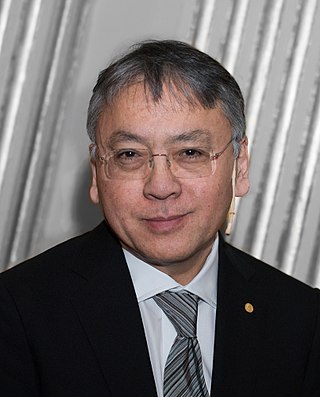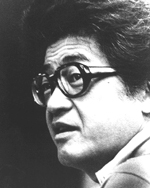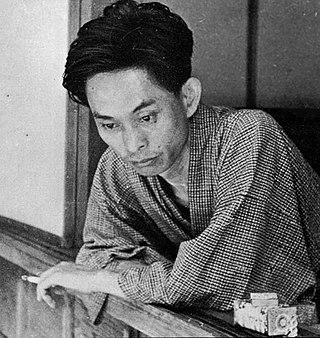
Haiku is a type of short form poetry that originated in Japan, and can be traced back from the influence of traditional Chinese poetry. Traditional Japanese haiku consist of three phrases composed of 17 morae in a 5, 7, 5 pattern; that include a kireji, or "cutting word"; and a kigo, or seasonal reference. However, haiku by classical Japanese poets, such as Matsuo Bashō, also deviate from the 17-on pattern and sometimes do not contain a kireji. Similar poems that do not adhere to these rules are generally classified as senryū.

A pen name or nom-de-plume is a pseudonym adopted by an author and printed on the title page or by-line of their works in place of their real name.

Lu Xun, born Zhou Zhangshou, was a Chinese writer, literary critic, lecturer, and state servant. He was a leading figure of modern Chinese literature. Writing in vernacular and Literary Chinese, he was a short story writer, editor, translator, literary critic, essayist, poet, and designer. In the 1930s, he became the titular head of the League of Left-Wing Writers in Shanghai during republican-era China (1912–1949).

Sir Kazuo Ishiguro is a Japanese-born British novelist, screenwriter, musician, and short-story writer. He is one of the most critically acclaimed contemporary fiction authors writing in English, having been awarded the 2017 Nobel Prize in Literature. In its citation, the Swedish Academy described Ishiguro as a writer "who, in novels of great emotional force, has uncovered the abyss beneath our illusory sense of connection with the world".
Japanese names in modern times consist of a family name (surname) followed by a given name. Japanese names are usually written in kanji, where the pronunciation follows a special set of rules. Because parents when naming children, and foreigners when adopting a Japanese name, are able to choose which pronunciations they want for certain kanji, the same written form of a name may have multiple readings. In exceptional cases, this makes it impossible to determine the intended pronunciation of a name with certainty. Even so, most pronunciations chosen for names are common, making them easier to read. While any jōyō kanji and jinmeiyō kanji may be used as part of a name, names may be rejected if they are believed to fall outside what would be considered an acceptable name by measures of common sense.
The year 1993 in film involved many significant films, including the blockbuster hits Jurassic Park, The Fugitive, and The Firm.

Shūji Tsushima, known by his pen name Osamu Dazai, was a Japanese novelist and author. A number of his most popular works, such as The Setting Sun and No Longer Human, are considered modern-day classics.

Natsume Sōseki, pen name Sōseki, born Natsume Kin'nosuke, was a Japanese novelist. He is best known for his novels Kokoro, Botchan, I Am a Cat, Kusamakura and his unfinished work Light and Darkness. He was also a scholar of British literature and writer of haiku, kanshi poetry and fairy tales.

Kōbō Abe, pen name of Kimifusa Abe, was a Japanese writer, playwright, musician, photographer, and inventor. He is best known for his 1962 novel The Woman in the Dunes that was made into an award-winning film by Hiroshi Teshigahara in 1964. Abe has often been compared to Franz Kafka for his modernist sensibilities and his surreal, often nightmarish explorations of individuals in contemporary society. He died aged 68 of heart failure in Tokyo after a brief illness.

Zhao is a Chinese-language surname. The name is first in the Hundred Family Surnames – the traditional list of all Chinese surnames – because it was the emperor's surname of the Song dynasty (960–1279) when the list was compiled. The first line of the poem is 趙錢孫李.

Yasunari Kawabata was a Japanese novelist and short story writer whose spare, lyrical, subtly-shaded prose works won him the 1968 Nobel Prize in Literature, the first Japanese author to receive the award. His works have enjoyed broad international appeal and are still widely read.

S. C. Johnson & Son, Inc. is an American multinational corporation, privately held manufacturer of household cleaning supplies and other consumer chemicals based in Racine, Wisconsin. In 2017, S. C. Johnson employed approximately 13,000 people and had estimated sales of $10 billion.
Kitsuno was a Japanese woman from the Sengoku period to the Azuchi–Momoyama period. She was a concubine of Oda Nobunaga, a Sengoku Daimyō of the Owari Province.

Lawson Fusao Inada is a Japanese American poet. He was the fifth poet laureate of the state of Oregon.
A mononym is a name composed of only one word. An individual who is known and addressed by a mononym is a mononymous person.

Bleeding Cool is an Internet news site, focusing on comics, television, film, board games, and video games. Owned by Avatar Press, it was launched by Rich Johnston on March 27, 2009. Avatar Press also publishes an associated magazine, also called Bleeding Cool.

Kodansha Ltd. is a Japanese privately held publishing company headquartered in Bunkyō, Tokyo. Kodansha publishes the manga magazines Nakayoshi, Afternoon, Evening, Weekly Shōnen Magazine, and Bessatsu Shōnen Magazine, as well as the more literary magazines Gunzō, Shūkan Gendai, and the Japanese dictionary, Nihongo Daijiten. Kodansha was founded by Seiji Noma in 1910, and members of his family continue as its owners either directly or through the Noma Cultural Foundation.

Spy × Family is a Japanese manga series written and illustrated by Tatsuya Endo. The story follows a spy who has to "build a family" to execute a mission, not realizing that his adopted daughter is a telepath, and the woman he agrees to marry is a skilled assassin. The series has been serialized biweekly on Shueisha's Shōnen Jump+ platform since March 2019, with its chapters collected in 14 tankōbon volumes as of September 2024. It was licensed in North America by Viz Media.